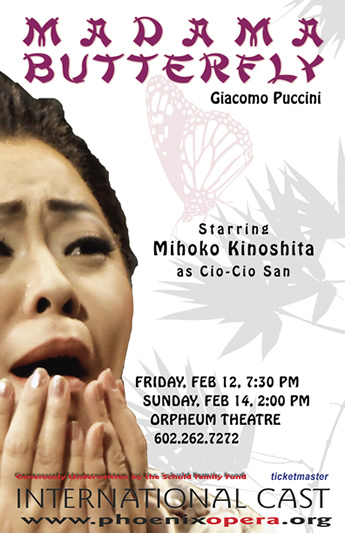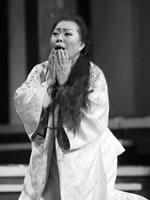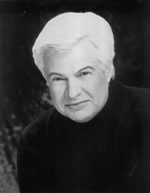
Madama Butterfly
by Giacomo Puccini
Madama Butterfly is an opera by Giacomo Puccini, with an Italian libretto by Luigi Illica and Giuseppe Giacosa. Puccini based his opera in part on the short story "Madame Butterfly" (1898) by John Luther Long, which was dramatized by David Belasco. According to one scholar, the opera was based on events that actually occurred in Nagasaki in the early 1890s.
Madama Butterfly Cast Members
Mihoko Kinoshita (Cio-Cio San)
Soprano Mihoko Kinoshita is renowned for her passion and rich voice. She is regarded as one of the greatest Cio- Cio Sans because of her extraordinary acting abilities. Mihoko was born in Kagoshima, Japan where she earned her Bachelor and Masters Degree at the Musashino Academy of Music. In 2001, she travelled to Italy on a Rotary International Friendship Scholarship, Recruit Scholarship, and Rome Music Foundation Scholarship to continue her music studies.
Gail Dubinbaum (Suzuki / Founder/Creative Director)
Mezzo-soprano Gail Dubinbaum has performed both opera and concert works internationally. She has sung leading roles with some of the world’s most prestigious opera companies including the Metropolitan Opera, Vienna Staatsoper, Israel Opera and L’Opera de Montreal. Nationally, she has appeared with Opera Pacific, Michigan Opera and Portland Opera.
Jon Burton (Pinkerton)
Jon Burton began singing in high school and started his professional career performing musicals and light operas for the Southern Ohio Light Opera Company that included roles as Horace in Hello Dolly, Pellinore in Camelot, Eisenstein and Alfred in Die Fledermaus, Caliph in Kismet, Camille and Danillo in The Merry Widow, Barinkay in Gypsy Baron, and six different Gilbert and Sullivan leads including The Mikad and Yeomen of the Guard, The Gondoliers, Princess Ida and Ruddigore.
Mauro Augustini (Sharpless)
Baritone Mauro Augustini was born near Venice, Italy. Upon winning several Italian vocal competitions, he made his professional debut singing Baron Scarpia in Tosca at Saragozza, Spain. His vocal preparation with famous tenor Mario Del Monaco later included interpretive studies with Tito Gobbi.
Gabriel Gargari (Goro)
A first generation Mexican-American, tenor Gabriel Gargari just sang at the Erwin Piscator Award Ceremony honoring distinguished actress Marian Seldes given by Elysium Between Two Continents. He made his Carnegie Hall/Weill Recital Hall debut with Elysium, this past year. Gabriel has the support and patronage of Mexico’s Manuel S. Leyva Martinez, a world renowned poet from the state of Guerrero in Mexico.
Michael Gallup (Bonze)
Michael Gallup is praised as much for his acting abilities as for his tremendous vocal range from high falsetto to deep basso. He has appeared with many opera companies throughout the United States, including the Los Angeles Opera, Dallas Opera, New Jersey State Opera, Michigan Opera Theatre, Opera Pacific, Portland Opera, Seattle Opera, San Diego Opera, Long Beach Opera, Arizona Opera, Anchorage Opera, Dayton Opera, Orlando Opera and Palm Beach Opera.
Andrew Gray (Imperial Commissioner)
Australian-American bass-baritone Andrew Gray performed the role of The King of Egypt in Phoenix Opera’s epic Aïda, last season. He has just returned to us from Michigan Opera Theater where he successfully performed the roles of the Sacerdote di Belo in Verdi’s Nabucco, and Mr. Lindquist in Sondheim’s A Little Night Music with Ron Rains and Leslie Uggams.
Robb Harrison (Yamadori)
Baritone Robb Harrison is recognized as a gifted performer both on the recital and operatic stage. He has performed the roles of Guglielmo in Cosi fan Tutte, Damis in Tartuffe, the Shoe Salesman in Dominic Argento’s A Postcard from Morocco, Lysander in Michael Ching’s A Midsummer Night’s Dream at Opera America, and Junius in The Rape of Lucretia. This past summer Robb was a studio artist with Opera New Jersey.
Erin Tompkins (Kate Pinkerton)
A creative and passionate performer, Erin Tompkins is an emerging young mezzo who graduated on artistic scholarship from Southern Methodist University in Dallas, Texas and currently studies voice with Gail Dubinbaum Massaro.
John Massaro (Founder/Artistic Director)
For nearly three decades, John Massaro has conducted opera, orchestral and choral music throughout the United States, Canada, Europe and the Middle East. Mr. Massaro most recently conducted Phoenix Opera’s 2007 premiere of La Bohème, Tosca in 2008, Aïda and Carmen in 2009.
Anthony Laciura (Director)
Time flies when you’re enjoying yourself. That popular sentiment occurred to Anthony Laciura as he heard an announcer introduce him as the host for a recent Saturday afternoon Metropolitan Opera broadcast. The facts, for the moment, startled him: 860 performances of some 59 roles! “I did all that?” he thought to himself. For the past twenty-five consecutive seasons, yes, he did all that.
Paul Black (Lighting Design)
Mr. Black is proud to be Phoenix Opera's Resident Lighting Designer. Paul just returned from Philadelphia where he lit the world premiere of The Eclectic Society at Walnut Street Theatre and leaves immediately for New York where he will be lighting a production of Romance, Romance.
David J. Castellano (Production Director)
Mr. Castellano received his Bachelor of Fine Arts in Production, Design and Technology from the University of Evansville’s School of Theatre and his Master of Fine Scenic and Costume Design Arts from Ohio University’s School of Theatre. This makes this his third season with Phoenix Opera as the Director of Productions.
The Story of Madama Butterfly
ACT I.
U.S. Navy lieutenant B. F. Pinkerton inspects the house he has leased from a marriage broker, Goro, who has procured him servants and a geisha wife, Cio-Cio-San, known as Butterfly. The American consul, Sharpless, arrives, and Pinkerton describes the carefree philosophy of a sailor roaming the world in search of pleasure. At the moment, he is enchanted with the fragile Cio-Cio-San, but the 999-year contract Goro has arranged contains a monthly renewal option. When Sharpless warns that the girl may not take her vows so lightly, Pinkerton brushes aside such scruples, saying he will one day marry a "real" American wife. Cio-Cio-San is heard in the distance joyously singing of her wedding. Entering surrounded by friends, she tells Pinkerton about her background; she belongs to an honorable family, but when they fell on hard times, she had to earn her living as a geisha. Her relatives bustle in, noisily expressing their opinions on the marriage. In a quiet moment, Cio-Cio-San shows her bridegroom her few earthly treasures, among them the dagger with which her father committed hara-kiri, and tells Pinkerton she intends to embrace his Christian faith. The Imperial Commissioner performs the wedding ceremony. The celebration is interrupted by Cio-Cio-San's uncle, a Buddhist monk, who curses the girl for renouncing her ancestors' religion. Pinkerton angrily sends the guests away. Alone with Cio-Cio-San in the moonlit garden, he dries her tears, and she joins him in singing of their love.
ACT II.
Three years later, Cio-Cio-San awaits her husband's return. As Suzuki prays to her gods for aid, her mistress stands in the doorway, her eyes fixed on the harbor. When the maid shows her how little money is left, Cio-Cio-San urges her to have faith: one fine day, Pinkerton's ship will appear on the horizon. Sharpless brings a letter from the lieutenant, but before he can read it, Goro presents a wealthy suitor, Prince Yamadori. The girl dismisses both the marriage broker and the prince, insisting that her American husband has not deserted her. Sharpless tries tactfully to suggest that she might be better off with Yamadori, but Cio-Cio-San proudly carries forth her child, saying that as soon as Pinkerton knows of his son's existence he surely will come back; if he does not, she would rather die than return to her former life. Moved by her devotion and faith, Sharpless leaves. Cio-Cio-San, on the point of despair, hears a cannon report; seizing a spyglass, she discovers Pinkerton's ship entering the harbor. Delirious with joy, she orders Suzuki to help her strew the house with flowers. As night falls, Cio-Cio-San, Suzuki and the child begin their vigil.
ACT III.
As dawn breaks, Suzuki insists that Cio-Cio-San rest. Humming a lullaby to her son, she carries him to another room. Before long, Sharpless enters with Pinkerton, followed by Kate, his new wife. When Suzuki learns who the American woman is, she is heartbroken, but she agrees for the sake of the child to aid in breaking the news to her mistress. Pinkerton, overcome with remorse, begs Sharpless to speak to Cio-Cio-San for him, then bids an anguished farewell to the scene of his former happiness and rushes away. When Cio-Cio-San comes forth expecting to find her beloved, she finds Kate instead. Guessing the truth, Cio-Cio-San agrees to give up her child if his father will return for him. Then, sending even Suzuki away, she takes out her father's dagger and bows before a statue of Buddha, preparing to die with honor rather than live in disgrace. Just as she raises the blade, Suzuki pushes the child into the room. Sobbing a last farewell, Cio-Cio-San sends him into the garden to play, then stabs herself. As she dies, Pinkerton is heard calling her name.
© Copyright OPERA NEWS 2007. Reprinted with permission



.jpg)
.jpg)
.jpg)










